Say NO to Closing Lafayette, Bennett, East, MLK
• Raising Quality of Public Schools Requires an Increase in Public Control
• Redesign Plans Call for Schools to be Organizing Centers for Community
• Cuomo Calls “Education Bureaucracy” the Enemy and Targets Buffalo
• Was Dr. Perry Brought to Buffalo to Split Teachers and Parents?
Say NO to Closing Lafayette, Bennett, East, MLK
Raising Quality of Public Schools Requires an Increase in Public Control
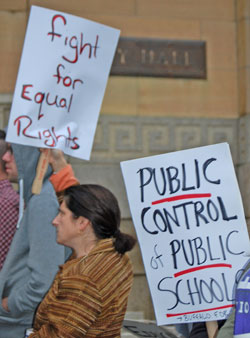 Lafayette, Bennett, East, and MLK, four schools targeted for closure by the New York State Education Department (NYSED) are organizing to oppose these efforts and instead keep their schools public and increase public control of them. Organizing efforts at all the schools are involving students, teachers, staff, parents and various organizations in this struggle and urging all to join in improving the quality of education. Through their own efforts and in the face of huge pressure from NYSED, including arbitrary requirements and very limited time for some, all four schools developed redesign plans for their schools. Unlike NYSED, which operates mainly behind closed doors and without providing information to the public, these schools all engaged the public in developing the plans.
Lafayette, Bennett, East, and MLK, four schools targeted for closure by the New York State Education Department (NYSED) are organizing to oppose these efforts and instead keep their schools public and increase public control of them. Organizing efforts at all the schools are involving students, teachers, staff, parents and various organizations in this struggle and urging all to join in improving the quality of education. Through their own efforts and in the face of huge pressure from NYSED, including arbitrary requirements and very limited time for some, all four schools developed redesign plans for their schools. Unlike NYSED, which operates mainly behind closed doors and without providing information to the public, these schools all engaged the public in developing the plans.
Organizing included distributing main highlights of the redesign plans (which commonly are 50-100+ pages long) to the public, putting content on facebook and webpages for public comments and public meetings where all concerned were able to speak and voice their views. Organizing was done to include alumni as well as current students, teachers as well as principals, existing staff as well as community organizations ready to contribute to raising the quality of education.
Hundreds of people participated in the various activities. What stood out at every meeting is the broad desire of the people to keep schools public and to have schools serve as centers for the community — such as for after school programs, meetings, evening classes, family sports and music, art, day care, and more.
Buffalo Forum applauds the teams at the schools and all those who participated in formulating and presenting the redesign plans to the public. These meetings and efforts have been an important part of developing the fight for Public Control of Public Schools! The organizing made clear people want to have more say and a deciding say in their schools, not closures and private takeovers where the public has no say.
The schools, including the buildings, belong to the public. Communities are best served by increasing the role and control of teachers, staff, students and parents together in deciding matters of education. This includes designing the content of curriculum, how best to assess development by students and teachers alike, methods of teaching and learning as well as day and evening programs at the school that best suit the needs of the communities they serve.
The redesign plans have now been submitted to the Buffalo School Board, which can accept or modify them or accept other plans that could be submitted by private interests. (Only one other plan, for MLK, was submitted by a for-profit group,
Center for Modern Socratic Innovation.) The School Board must approve plans by January 28 and students, parents and teachers are gearing up to participate at that meeting. They could also vote sooner, Wednesday, January 14, 2015. A rally to fight for Public Control of Public Schools and reject efforts to close the four schools has been planned for 4:30pm, at Waterfront School, where the meeting is being held.
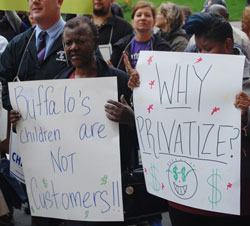 Once the School Board votes, plans must then be submitted to NYSED by January 30, 2015. NYSED has the final say and can, as has occurred in the past, reject plans approved by the board, using arbitrary excuses and then close the schools as early as the 2015 school year. They could also turn them over to private charters. Two private charters, Kaleida's Health Sciences and Tapestry and currently trying to secure space these public school buildings. Such actions to eliminate the public from having any say over what happens to the schools may be taken over the summer to take advantage of the absence of teachers, students and staff.
Once the School Board votes, plans must then be submitted to NYSED by January 30, 2015. NYSED has the final say and can, as has occurred in the past, reject plans approved by the board, using arbitrary excuses and then close the schools as early as the 2015 school year. They could also turn them over to private charters. Two private charters, Kaleida's Health Sciences and Tapestry and currently trying to secure space these public school buildings. Such actions to eliminate the public from having any say over what happens to the schools may be taken over the summer to take advantage of the absence of teachers, students and staff.
Stepping up organizing now for Public Control of Public Schools is even more important. This can be done through more public meetings, house meetings, joint efforts by community and school organizations, and more. Buffalo Forum urges Buffalo School Board members to organize public meetings starting now through the end of January, to continue to provide public space to debate and develop unity in defending our public schools and in blocking state efforts to close them. We urge the four targeted schools to continue to have public meetings and to involve all concerned in defending the schools and preparing to block any efforts to close them.
Public education that meets the needs of the youth is a social necessity and responsibility. By relying on our own efforts and defending the right to education and public right to have control, we can defend our public schools and raise their quality.
[TOP]
Redesign Plans Call for Schools to be Organizing Centers for Community
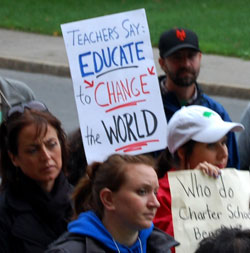 Recent public meetings by Bennett, East and Lafayette High Schools and the Martin Luther King (MLK) Multicultural Institute (pre-K - 8) presented redesign plans for these schools that were developed by teachers, staff, administrators and alumni. The plans addressed student needs as well as striving to serve the communities that surround the schools.
Recent public meetings by Bennett, East and Lafayette High Schools and the Martin Luther King (MLK) Multicultural Institute (pre-K - 8) presented redesign plans for these schools that were developed by teachers, staff, administrators and alumni. The plans addressed student needs as well as striving to serve the communities that surround the schools.
MLK Innovations
The plan for MLK is perhaps the most innovative, with great effort to directly involve students more in deciding issues of education. The plan uses themes that address social problems, such as Social Justice and Human Rights and Environmental Advocacy. It is project-based and interdisciplinary, with students and teachers together deciding the questions addressed and the design of projects. It is vertically aligned, so students at all grade levels are addressing similar themes while engaging in varied activities based on their level.
Learning includes going into the community to do surveys and assess needs and adjust projects accordingly. This serves to involve students in identifying problems as well as involving people in the surrounding communities in discussion about solutions.
The plan also includes ways to involve parents more in educational and other school activities, including participating in the classroom, volunteering, newsletters and generally participating in decision-making. It puts in place collaboration of various kinds with Buffalo organizations, so as to further enrich the education while unifying all those involved in working to raise the quality of the public schools. The overall spirit is to direct education to engaging all in finding solutions to existing social problems and do so on the basis of increasing the decision-making role of students, teachers, staff and the broader community.
Plans for High Schools
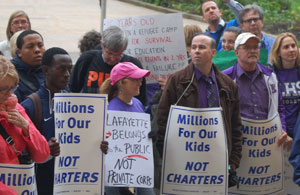 Lafayette, on the west side and with a large number of refugees and non-English speakers, will address the needs of their students by having the International Newcomer Academy, to include 12-16 year olds district-wide. Lafayette currently has a student population that is 70 percent English Language Learners. This Academy will be cross-curricular and bring students up to grade-level reading and writing skills. The plan also includes interpreter training so students can assist those in the community and prepare for such work. It will also have other academies within the school, such as an Educators Academy and one for travel and tourism.
Lafayette, on the west side and with a large number of refugees and non-English speakers, will address the needs of their students by having the International Newcomer Academy, to include 12-16 year olds district-wide. Lafayette currently has a student population that is 70 percent English Language Learners. This Academy will be cross-curricular and bring students up to grade-level reading and writing skills. The plan also includes interpreter training so students can assist those in the community and prepare for such work. It will also have other academies within the school, such as an Educators Academy and one for travel and tourism.
East and Bennett proposed to keep their schools open until 9pm and provide GED, adult-education and vocational classes, family supports including child care, sports and recreation, and other needs. The aim is for the schools to serve as community organizing and educational resource centers, contributing to raising the quality of education for students and the community as a whole.
Both schools also had specific proposals for students to gain college credits and cross-curriculum studies as well as job-related studies (known as Career and Technical Education, CTE). These include health programs for certified nursing assistants and medical coding as well as dietary assistant and fitness training at East High School. At Bennett, it includes programs for the building trades and business. Both schools also plan to add an eighth grade and provide special supports for improving reading and math skills for eighth and ninth graders.
While each school has its particularities what was clear to all attending these meetings was the drive to raise the quality of education and keep the public schools public. There is recognition that education needs to be looked at anew and schools organized in such a way that they meet the needs of students, teachers, communities and society as a whole. The redesign plans are an effort in that direction and should be supported by all.
[TOP]
Cuomo Calls “Education Bureaucracy” the Enemy and Targets Buffalo
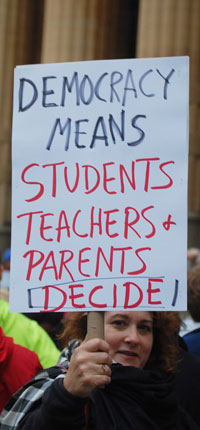 On December 18, Governor Andrew Cuomo’s office sent a letter to Dr. Merryl Tisch, Chancellor of New York State (NYS) Schools, and Dr. John King, out-going NYS Commissioner of Education. The letter, sent by the Director of State Operations, says Cuomo intends to introduce an “aggressive legislative package” to “reform” public education. The letter then has a list of 12 questions for Tisch and King that show Cuomo will aggressively pursue eliminating the public school system and the role of the public in governance. This is all done in the name of benefiting the students — who are not consulted or involved in any way!
On December 18, Governor Andrew Cuomo’s office sent a letter to Dr. Merryl Tisch, Chancellor of New York State (NYS) Schools, and Dr. John King, out-going NYS Commissioner of Education. The letter, sent by the Director of State Operations, says Cuomo intends to introduce an “aggressive legislative package” to “reform” public education. The letter then has a list of 12 questions for Tisch and King that show Cuomo will aggressively pursue eliminating the public school system and the role of the public in governance. This is all done in the name of benefiting the students — who are not consulted or involved in any way!
This direction is made most clear at the end of the letter, which once again claims that public schools, with unionized public teachers, are a “monopoly” that must be broken up. The letter can be read to expand the forces being targeted to include principals, school boards and district administrators. This is particularly true given the content preceding it, such as more mayoral control and consolidation and regionalization of school districts.
The letter states: “Several weeks ago Governor Cuomo said that improving education is thwarted by the monopoly of the education bureaucracy.
The education bureaucracy's mission is to sustain the bureaucracy and the status quo and therefore it is often the enemy of change. The result is the current system perpetuates the bureaucracy but fails our students in many ways.” While the letter shows the main focus of Cuomo’s attack remains teachers, the use of “bureaucracy” also targets administrators and more generally public governance as the “enemy.” Why introduce such language?
Cuomo will not actually engage in a public debate on these issues and instead uses terms like enemy to try to silence discussion. King, similarly, was known for his refusal to hold public meetings. For example the meeting on the Common Core testing and teacher evaluation regime that King held in Buffalo (December 2013) was by invitation only and those invited were not permitted to speak. And while teachers, parents and students and organizations of various kinds have put forward, in public meetings, ways to defend the right to education and raise the quality of the schools, Cuomo ignores these efforts and proposals (see article above on redesign plans). He instead turns to Tisch and King, both known to block public participation and governance and support privatizing public schools, as King’s actions against Buffalo public schools show.
Buffalo Singled Out
 Buffalo is directly targeted in the letter. This is likely in part because of the firm resistance to attacks by Cuomo and NYSED. This includes opposing their efforts to close Buffalo schools and hand them over to private charters, which are known for doing no better or even worse than public schools when it comes to educating students. Teachers and parents together are joining in independent organizing to defend their interests, as shown in recent public forums. The Buffalo Teachers Federation refused to endorse Cuomo for governor and instead stood up for pro-education Green Party candidate Howie Hawkins. The Buffalo schools slated for closing by NYSED are all resisting, developing redesign plans and involving the public in that process. Efforts to split parents and teachers are not succeeding. School Board members are joining the fight too. These are among the factors leading to a concerted attack on Buffalo.
Buffalo is directly targeted in the letter. This is likely in part because of the firm resistance to attacks by Cuomo and NYSED. This includes opposing their efforts to close Buffalo schools and hand them over to private charters, which are known for doing no better or even worse than public schools when it comes to educating students. Teachers and parents together are joining in independent organizing to defend their interests, as shown in recent public forums. The Buffalo Teachers Federation refused to endorse Cuomo for governor and instead stood up for pro-education Green Party candidate Howie Hawkins. The Buffalo schools slated for closing by NYSED are all resisting, developing redesign plans and involving the public in that process. Efforts to split parents and teachers are not succeeding. School Board members are joining the fight too. These are among the factors leading to a concerted attack on Buffalo.
Cuomo, as a public official, takes no responsibility for the government failure to guarantee the equal right to education for all, including the funding and resources required for teachers to teach and students to learn. Instead, he blames the schools, and by inference the teachers, principals and district administrators. The letter asks, “What steps would you take to dramatically improve priority or struggling schools — schools that condemn a generation of kids to poor education and thus poor life prospects? Specifically, what should we do about the deplorable conditions of the education system in Buffalo?”
An economy that produces growing poverty and inequality can only produce “poor life prospects.” This is a function of an economy that does not meet the needs of the majority. The schools are not the source of the problem. Further, it is significant that Cuomo refers not to particular schools but to the “education system in Buffalo.” This is code for a state takeover of Buffalo Public Schools and subsequently their closure or privatization, using privately controlled charters. Both serve to eliminate public governance and weaken or eliminate the teachers’ union. This approach also eliminates public school boards and administrators. It is this public governance that Cuomo has in mind when he says the “bureaucracy” is the enemy. It is also why he is calling for more mayoral control of schools. In this way, power is concentrated in executives at the state and local level and the role of the public and public governance is eliminated.
State Imposed Teacher Evaluation
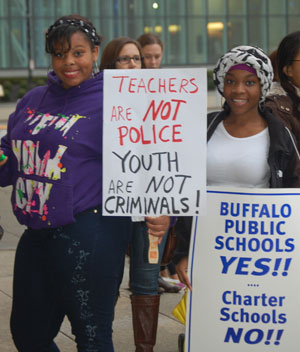 Five of Cuomo’s twelve questions are directed at teachers. The “questions” — actually proposals — include having the state impose, in law, scoring for teacher evaluations. The letter specifically calls classroom observation — known by educators to be a more reliable and useful means of evaluation than test scores — “subjective,” while test scores are considered “objective.” Had he asked parents, students and teachers, he would know that the test scores are not at all an objective measure of a student's abilities, development or contributions. He also must be deaf given the very loud rejection across the state of the Common Core testing and teacher evaluation regime by parents and teachers alike. More than 60,000 students refused to even take the state test last spring and many thousands more will do so at testing time in April 2015.
Five of Cuomo’s twelve questions are directed at teachers. The “questions” — actually proposals — include having the state impose, in law, scoring for teacher evaluations. The letter specifically calls classroom observation — known by educators to be a more reliable and useful means of evaluation than test scores — “subjective,” while test scores are considered “objective.” Had he asked parents, students and teachers, he would know that the test scores are not at all an objective measure of a student's abilities, development or contributions. He also must be deaf given the very loud rejection across the state of the Common Core testing and teacher evaluation regime by parents and teachers alike. More than 60,000 students refused to even take the state test last spring and many thousands more will do so at testing time in April 2015.
By having the state set evaluation scoring percentages in law, Cuomo wants to eliminate any negotiation by teachers on their evaluations — an instrument used to fire them. He wants to increase the weight given to test scores while decreasing the role of principals — human beings who know and work with the teachers. It is an effort to essentially be able to fire teachers at will and eliminate collective efforts by teachers to defend their rights.
This is further indicated in the additional attacks on teachers. Cuomo wants measures to more easily fire teachers. He wants to institute merit pay — “financial incentives” — which are known not to improve teaching while engendering a more insecure, competitive and divisive atmosphere. Teachers especially need a cooperative environment of mutual respect and assistance. Merit pay is designed to eliminate cooperation and collective resistance.
Cuomo also wants to change the teacher certification process, impose an additional competency test and extend the probationary period for teachers so it takes longer to get tenure. This is all done in the name of recruiting the “best and brightest.” But what bright teacher would want to work in such insecure, unjust and test-filled conditions where the state and not their peers and principals evaluate them and can fire them?! Cuomo’s demands likely pave the way for broad and increased use of un-certified, non-union college graduates who only teach for 3-5 years, as is already being done through Teach for America.
As an additional means to limit public governance, the letter asks, “Do you think we should restructure the current system through mergers, consolidations or regionalization?” Regionalization and mergers generally are a means to decrease representation and the role of the public. This is being proposed at a time when the problems society faces require increasing the role of the public. Indeed, that role needs to be raised to one of decision making by the people themselves. This is the requirement of democracy today. It is what parents, teachers, staff and students are fighting for as essential to renew the public schools, raise their quality and actually secure the equal right to education for all. Fighting in this direction of defending rights and demanding the public right to decide is precisely what Cuomo is trying to prevent.
[TOP]
Was Dr. Perry Brought to Buffalo
to Split Teachers and Parents?
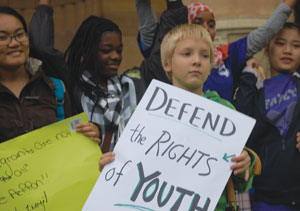 Many attending the recent Community Action Organization (CAO) event where Dr. Perry of Hartford Connecticut spoke anticipated that he would give emphasis to private charter schools as a means to improve education in Buffalo. That is what he has done elsewhere. He himself has formed a charter school management company, though at present it does not manage any charter schools. So a presentation on private charters was anticipated.
Many attending the recent Community Action Organization (CAO) event where Dr. Perry of Hartford Connecticut spoke anticipated that he would give emphasis to private charter schools as a means to improve education in Buffalo. That is what he has done elsewhere. He himself has formed a charter school management company, though at present it does not manage any charter schools. So a presentation on private charters was anticipated.
As he brought out at the meeting though, Dr. Perry is the principal of a public magnet school in Hartford. Whatever he has accomplished in relation to education has been done at a public school, with public unionized teachers. This fact is likely part of the reason Dr. Perry encouraged those attending to demand that successful schools in Buffalo, like City Honors, be replicated and more seats provided at them as one step to take.
Given Dr. Perry is a skilful speaker who mixes story telling and jokes into his presentation, it is significant that he barely spoke about private charter schools. He clearly did not forget to do so. Rather, he likely had a different aim in mind in speaking to the largely African American crowd. That aim appears to be to split these parents from Buffalo teachers.
Perry emphasized that graduation rates and reading levels in Buffalo were not acceptable and that parents had to act to do something about it. Perry then went out of his way to target teachers as the problem. It is true that parents need to demand — and are demanding through various organizations and at school board meetings — that public schools be improved and renewed so as to meet the rights of youth and the needs of society today. The issue is, how is blaming teachers going to do that? The long history of the struggle for public schools, including opposing their segregation by the government, incorporating African American studies, broad curriculum and libraries to support them, readily shows that it is by uniting students, parents and teachers together that advances are made. A united effort is required to gain an outcome that favors the people.
Splitting parents and teachers and pitting them against each other only worsens the prospects for improving and renewing the schools. It serves to create conditions for eliminating public governance; putting publicly funded schools in private charter hands; and eliminating teachers as a profession. This direction is consistent with efforts being made by Governor Cuomo and the rich billionaires he represents (see article above). It is consistent with closing schools, state takeovers and charter takeovers — all of which greatly eliminates the role of parents in the education of their children. What is needed is expanding that role and creating conditions for parents, teachers, staff and students to together decide all matters of education.
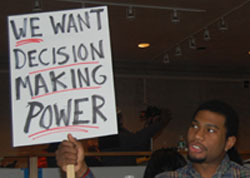 Dr. Perry also sought to dismiss poverty — a major problem in Buffalo — as a factor influencing learning. This was done mainly through sleight of hand. Responding to a questioner who raised that poverty is a factor in learning, Perry said poverty does not determine whether an individual will succeed. To prove his point he asked the audience if they were born poor. The majority raised their hands. He then asked how many were college graduates. The majority raised their hands, an accomplishment applauded by all.
Dr. Perry also sought to dismiss poverty — a major problem in Buffalo — as a factor influencing learning. This was done mainly through sleight of hand. Responding to a questioner who raised that poverty is a factor in learning, Perry said poverty does not determine whether an individual will succeed. To prove his point he asked the audience if they were born poor. The majority raised their hands. He then asked how many were college graduates. The majority raised their hands, an accomplishment applauded by all.
However, the issue is not whether someone born into poverty can learn. All children can learn. The issue is whether poverty negatively impacts learning for students as a group, a collective, and as individuals. Facts on this are overwhelming — yes it does.
Addressing the problem of poverty is an important part of addressing problems of education in Buffalo. This is not to ignore the role of teachers inside the buildings, which is significant. But rather to recognize that raising the quality of education means raising employment and taking measures to compensate for the difficulties facing poor working parents — the majority of parents in Buffalo.
The redesign plans submitted by the four schools facing closing are efforts to do this, by keeping schools open longer, providing parents and family classes and supports, engaging parents, teachers and students together in solving problems, etc. Perry said not word one about these efforts and their value to improving reading and the quality of education more generally. He did repeat several times that parents should push to close Buffalo schools. Again, no mention that such closures would open the way for more private charter schools, which mean less possibility for parent involvement when more is required.
Why not argue out directly why the redesign plans do not serve to raise the quality of education and therefore the schools must close? Why not speak to the united efforts by parents and teachers at these schools as positive examples to be replicated? This would have contributed to concrete action parents can actually take to improve the schools and the surrounding communities. So too would urging all concerned to unite in the fight to defend the equal right to education for all and to develop our own alternatives where students, parents and teachers together decide.
[TOP]
